Class 7 - Host Your Own Networks
Class Schedule
- Cyberdeck presentations
- Servers
Pre-history: political/social events and self-hosting Intranets
Historic social, political and environmental moments prior to the current movement of DIY self-hosting. These are several selected moments, not a complete history.
- Occupy
- “Arab Spring” movements and crackdown by governments
- Superstorm Sandy and the lack of infrastructure and missing federal responses and the rise of new mutual aid
- The ubiquity of Amazon AWS along with other server companies

Internet station at Occupy Wall Street –by Leopoldina Fortunati CC BY NC
Occupy Here: A Tiny Self-Contained Darknet, by Dan Phiffer
Occupy.here began two years ago as an experiment for the encampment at Zuccotti Park. It was a wifi router hacked to run OpenWrt Linux (an operating system mostly used for computer networking) and a small “captive portal” website. When users joined the wifi network and attempted to load any URL, they were redirected to http://occupy.here. The web software offered up a simple BBS-style message board providing its users with a space to share messages and files.–by Dan Phiffer

How Egypt Disappeared from the Internet, from Five Years After Egypt, by Doug Madory
This week marks a somber milestone in Internet history: the 5-year anniversary of former Egyptian President Hosni Mubarak’s order to shutdown his country’s access to the global Internet amid widespread protests. Similar popular protests would sweep through the region during a time frame that became known as the Arab Spring. Within days of the Egyptian blackout, Internet service would be restored and Mubarak would resign after 30 years in power. –from Five Years After Egypt via Internet Archive Wayback Machine
What is a server?
Client–server systems are usually most frequently implemented by (and often identified with) the request–response model: a client sends a request to the server, which performs some action and sends a response back to the client, typically with a result or acknowledgment. Designating a computer as “server-class hardware” implies that it is specialized for running servers on it. This often implies that it is more powerful and reliable than standard personal computers, but alternatively, large computing clusters may be composed of many relatively simple, replaceable server components. –from Wikipedia, CC BY SA 4 0
How does the Internet Work? Networks and addresses explained, by Basics Explained, H3Vtux
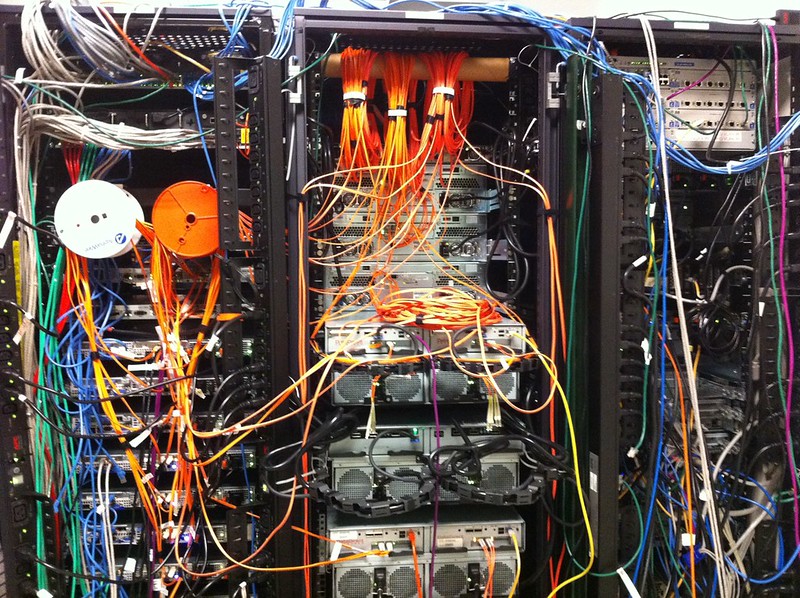
servers photo by Alex, CC BY 2.0

Google servers, cc1.0
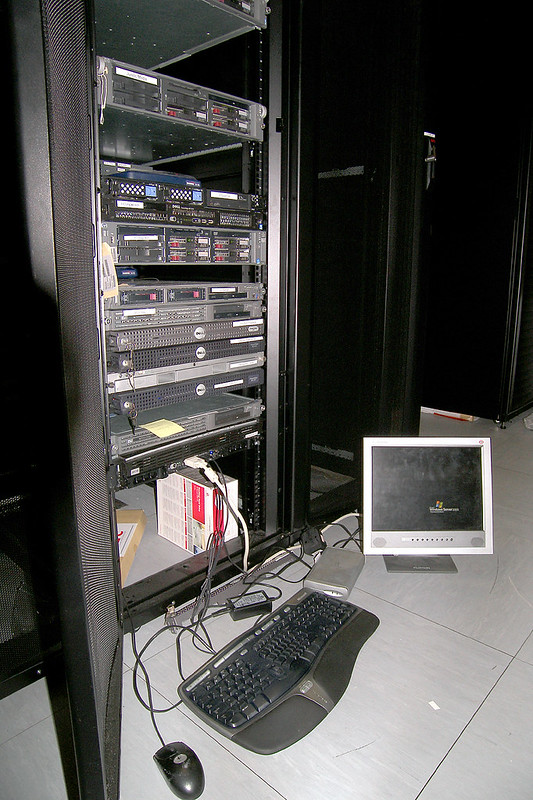
Home server by Danny Hope, CC BY 2.0
Piratebox

PirateBox provides easy file sharing and messaging over a local area network. PirateBox is designed to educate the public and make them aware about online censorship, surveillance and freedom of speech. PirateBox truly respects privacy and thus does not collect any access or connection logs from its users. PirateBox has an educational purpose and aims to teach about computer programming and computer networks. PirateBox network (AP) should be open, and use open networking standards to allow communication with other users.
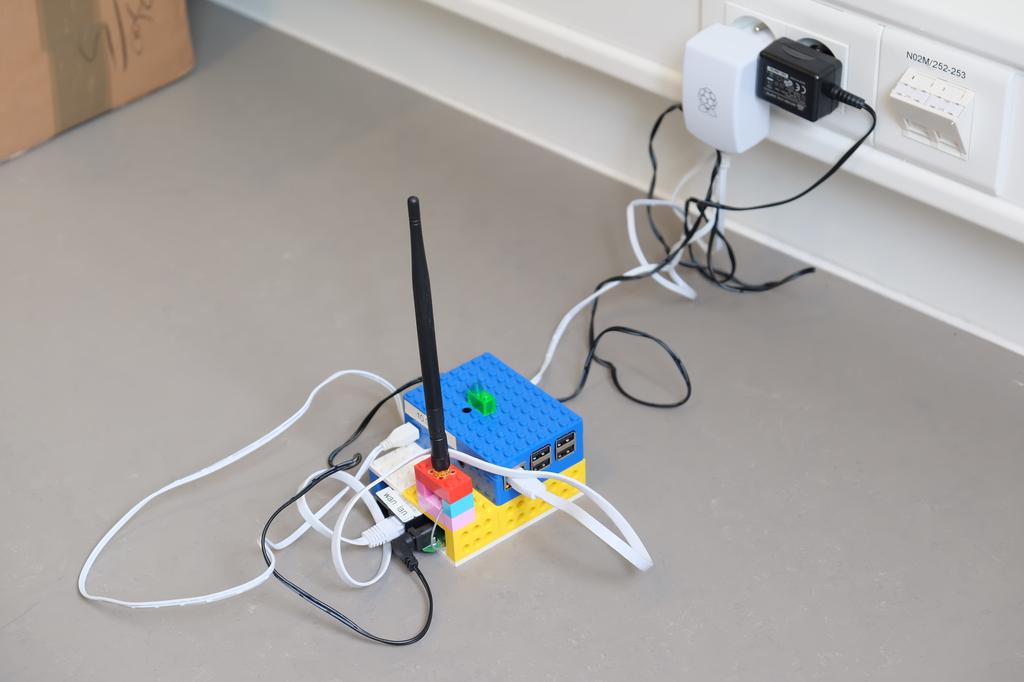
Etherbox image, via Network of Ones Own from constantvzw.org
Etherbox
Etherbox is a constellation of collective tools and practices that developed in and around Constant5. Etherbox responds to practical issues when collaborating in physical spaces with digital tools. In parallel, it became a platform to reflect on network technologies, on how to document artistic processes and on processes of collaboration.
Networks Of Ones Own
Networks Of One’s Own is a para-nodal periodic publication that is itself collectively written in a network2. Each of the episodes is thought of as the ‘release’ of a specific software stack, contextualised in its specific practice. The series aims to document a set of tools, experiences, ways of working that are diverse in terms of their temporality, granularity and persistence.–from Network of Ones Own
A Feminist Server
From the Feminist Server Manifesto 0.01
A feminist server…
- Is a situated technology. She has a sense of context and considers herself to be part of an ecology of practices
- Is run for and by a community that cares enough for her in order to make her exist
- Builds on the materiality of software, hardware and the bodies gathered around it
- Opens herself to expose processes, tools, sources, habits, patterns
- Does not strive for seamlessness. Talk of transparency too often signals that something is being made invisible
- Avoids efficiency, ease-of-use, scalability and immediacy because they can be traps
- Knows that networking is actually an awkward, promiscuous and parasitic practice
- Is autonomous in the sense that she decides for her own dependencies
- Radically questions the conditions for serving and service; experiments with changing client-server relations where she can
- Treats network technology as part of a social reality
- Wants networks to be mutable and read-write accessible
- Does not confuse safety with security
- Takes the risk of exposing her insecurity
-
Tries hard not to apologize when she is sometimes not available
- A Feminist Server Manifesto
- Feminist Server Summit Afterlife
- A wishlist for transfeminist servers
A Transversal Network of Feminist Servers
By server we mean a computer that can be connected to the Internet, run a website and provide file storage. It will be passed from one partner to another, as both a tool and collective storage to document the traces of our activities. Our feminist travelling server will therefore capture what emerges from a series of events related to the urgencies we described. We believe that such an approach to documentation will enable reflections, as well as making public the diversity of generated material. –from A Transversal Network of Feminist Servers
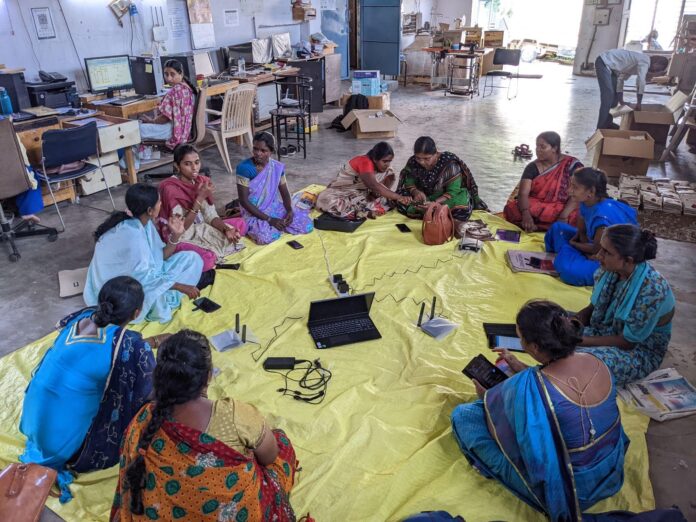
The HNs using the LTE sim routers to upload the narratives they collected during the week on Papad, while discussing and annotating in smaller groups. (Starting clockwise from the light blue woman on the left-hand side) Triveni, Jabeen Taj, Mangala, Chaya, Ramakka, Shilpa, Anitha, Mangalamma, Sarasvathamma, Rajeshwari, ZohraJabeen. (HNs not in the image): Saraswathi, Aasma. Image credits: Deisgn Beku –from ” ‘Feminist’ Server to Help People Own Their Own Data
In a world where our digital lives reside on servers owned by global conglomerates like Google and Microsoft, the feminist server is a way to reclaim ownership and management of our data. Co-creating digital infrastructure with local communities ensures agency in the knowledge creation and storage process. How can reimagining server ownership and management through a feminist lens help break the existing monopoly? There are two related ways by which a server can be considered as feminist. The first is based on who runs the server, and the second is based on who owns the server. Feminist critics have pointed out how the running of servers is often in the hands of male experts who are not keen to share and explain the knowledge required to maintain a server – a role known as a systems admin or, colloquially, a “sysadmin” person. Thus the concept of feminist servers emerged out of a need to challenge patriarchal dominance in hardware and infrastructure spaces, to create alternatives that were nurturing, anti-capitalist, and worked on the basis of community and solidarity. –from A ‘Feminist’ Server to Help People Own Their Own Data
Low Tech Magazine’s Solar Powered Website
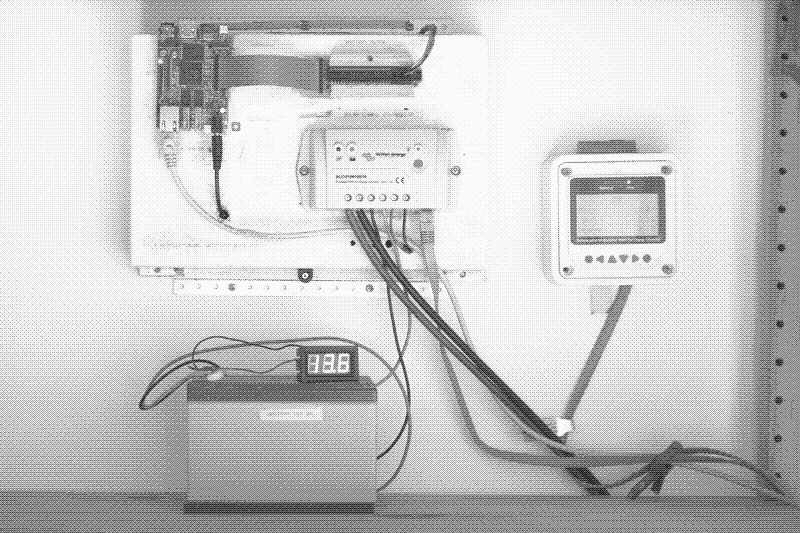
Low Tech Magazine’s solar power server, Kris de Kecker
This website is solar-powered and self-hosted. It has been designed to radically reduce the energy use associated with accessing our content….Low-tech Magazine questions the belief in technological progress, and highlights the potential of past knowledge and technologies for designing a sustainable society. Because a web redesign was long overdue – and because we try to practice what we preach – we decided to build a low-tech website that meets our needs and abides by our principles…. The Internet is not an autonomous being. Its growing energy use is the consequence of actual decisions made by software developers, web designers, marketing departments, publishers and internet users. With a lightweight, off-grid solar-powered website, we want to show that other decisions can be made.–from About The Solar Powered Website
Freedombox
Launched in 2010 by Prof. Eben Moglen, FreedomBox is a global project to empower regular people to reassert control over the infrastructure of the internet. FreedomBox empowers its users to avoid the data mining, censorship and surveillance by centralized silos that characterize the web of today. It makes web servers personal, affordable and manageable, so that a user can host necessary web services at home on a device they own, powered by free software they can trust. FreedomBox is made up of two things: a free and open source software system and inexpensive hardware. The costs of computer processors and network bandwidth have both fallen to such low levels that hosting your own digital services is now affordable. FreedomBox is a private server for non-experts: it lets you install and configure server applications with only a few clicks. It runs on cheap hardware of your choice, uses your internet connection and power, and is under your control. FreedomBox, a Debian pure blend, is a 100% free software self-hosting web server to deploy social applications on small machines. It provides online communication tools respecting your privacy and data ownership.
Yunohost

YunoHost is an operating system aiming to simplify server administration and therefore democratize self-hosting while making sure it stays reliable, secure, ethical and lightweight. It is a copylefted libre software project maintained exclusively by volunteers. Technically, it can be seen as a distribution based on Debian GNU/Linux and can be installed on many kinds of hardware.